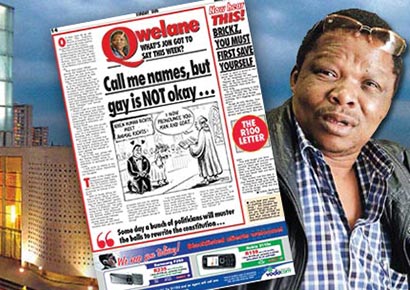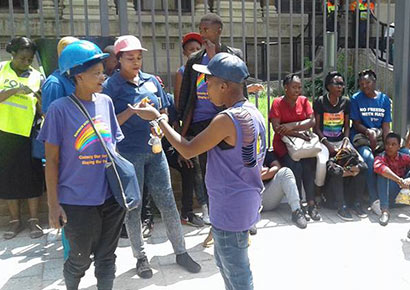Jon Qwelane doesn’t arrive, but gay hate speech trial goes on
 Despite his not being able to attend proceedings again, the eight-year-old Jon Qwelane hate speech case finally resumed in the Johannesburg High Court on Monday.
Despite his not being able to attend proceedings again, the eight-year-old Jon Qwelane hate speech case finally resumed in the Johannesburg High Court on Monday.
According to his advocate, Musatondwa Musandiwa, Qwelane was in hospital after he “collapsed at a shopping mall in Boksburg” over the weekend.
In August last year, the trial was suspended when Qwelane’s counsel also claimed that he was unable to attend because he was in poor health. On Monday, however, it was agreed that the matter would continue without him as he will not be asked to testify.
The SA Human Rights Commission (SAHRC) revealed in court that Qwelane’ controversial 2008 article Call me names, but gay is not okay was the subject of 350 complaints; the most it has ever received over one incident.
Musandiwa, however, inisted that the article was mere opinion and did not incite violence or harm against members of the LGBTI community.
The SAHRC’s advocate, Tembeka Ngcukaitobi, responded that the article and the accompanying cartoon, which compared same-sex marriage to bestiality, dehumanised LGBTI people.
“One must take into account that this dehumanisation has the distinct possibility of justifying physical harm and physical violence against gays and lesbians,” said Ngcukaitobi.
It was also pointed out that in the column Qwelane said he supported Robert Mugabe’s position on homosexuality. The homophobic Zimbabwean president infamously described gay people as “worse than pigs and dogs” and has called for their prosecution.
“There could be a few things I could take issue with Zimbabwe President Robert Mugabe, but his unflinching and unapologetic stance over homosexuals is definitely not among those,” wrote Qwelane at the time.
In the article, the former journalist and ambassador further urged lawmakers to remove the sexual orientation equality clause from the Constitution. He has refused to apologise for the column or his views.
Pandelis Gregoriou, Head of Legal Services at the SAHRC, submitted that the court should consider “the severe psychological and emotional harm that was being inflicted [on LGBTI individuals]” through the article.
He explained that it “classifies LGBT people as outsiders. It treats them as different. And on that basis discriminates against them and impunes their dignity.”
The Psychological Society of South Africa (PsySSA) will make submissions during the trial highlighting the “pernicious psychological and social effects of the speech” contained in the article.
Tshego Phala from the Pro Bono Practice at Webber Wentzel, who is representing PsySSA, told the Mamba Show on GaySA Radio that the trial should be extremely important to LGBTI South Africans.

Activists gather outside the Johannesburg High Court (Pic: FEW)
“Evidence has shown that hate speech leads to more intolerance,” she said. “Hate speech has also been shown to lead to hate crimes… and in South Africa the occurrence of hate crimes against members of the LGBT community is quite high.”
The case has additional significance as it will also address a constitutional challenge brought by Qwelane against sections of the Equality Act that address hate speech, claiming that these infringe on his right to free speech. A ruling on this could have far reaching consequences,
A number of activists protested outside the court on Monday on behalf of organisations such as the Forum for the Empowerment of Women (FEW) and People Opposing Women Abuse (POWA).
In 2011, an Equality Court ruled that Qwelane’s article “propagates hatred and harm against homosexuals” and ordered Qwelane to apologise to the gay community and to pay damages of R100,000 towards an LGBTI rights group. He had the ruling rescinded on a technicality, but the SAHRC re-filed the charges.
The trial is set to continue until 17 March.
Scum breed